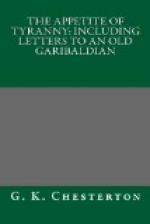But the vital point is here. The abstract barbarian would copy. The cockney and incomplete civilisation always sets itself up to be copied. And in the case here considered, the German thinks that it is not only his business to spread education, but to spread compulsory education. “Science combined with organisation,” says Professor Ostwald of Berlin University, “makes us terrible to our opponents and ensures a German future for Europe.” That is, as shortly as it can be put, what we are fighting about. We are fighting to prevent a German future for Europe. We think it would be narrower, nastier, less sane, less capable of liberty and of laughter, than any of the worst parts of the European past. And when I cast about for a form in which to explain shortly why we think so, I thought of you. For this is a matter so large that I know not how to express it except in terms of artists like you, in the service of beauty and the faith in freedom. Prussia, at least cannot help me; Lord Palmerston, I believe, called it a country of damned professors. Lord Palmerston, I fear, used the word “damned” more or less flippantly. I use it reverently.
Rome, at her very weakest, has always been a river that wanders and widens and that waters many fields. Berlin, at its strongest, will never be anything but a whirlpool, which seeks its own centre, and is sucked down. It would only narrow all the rest of Europe, as it has already narrowed all the rest of Germany. There is a spirit of diseased egoism, which at last makes all things spin upon one pin-point in the brain. It is a spirit expressed more often in the slangs than in the tongues of men. The English call it a fad. I do not know what the Italians call it; the Prussians call it philosophy.
Here is the sort of instance that made me think of you. What would you feel first, let us say, if I mentioned Michael Angelo? For the first moment, perhaps, boredom: such as I feel when Americans ask me about Stratford-on-Avon. But, supposing that just fear quieted, you would feel what I and every one else can feel. It might be the sense of the majestic hands of Man upon the locks of the last doors of life; large and terrible hands, like those of that youth who poises the stone above Florence, and looks out upon the circle of the hills. It might be that huge heave of flank and chest and throat in “The Slave,” which is like an earthquake lifting a whole landscape; it might be that tremendous Madonna, whose charity is more strong than death. Anyhow, your thoughts would be something worthy of the man’s terrible paganism and his more terrible Christianity. Who but God could have graven Michael Angelo; who came so near to graving the Mother of God?




